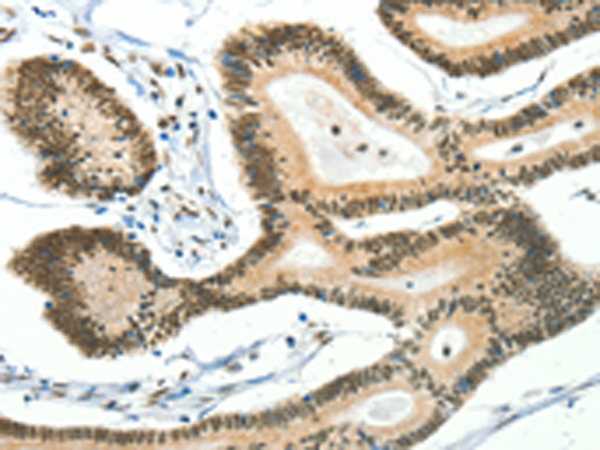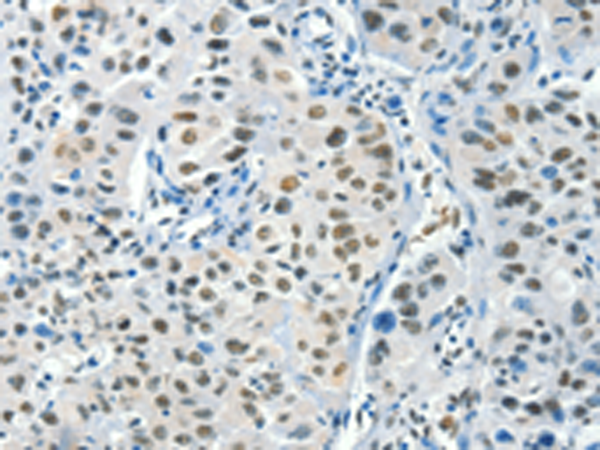


| WB | 咨询技术 | Human,Mouse,Rat |
| IF | 咨询技术 | Human,Mouse,Rat |
| IHC | 1/50-1/200 | Human,Mouse,Rat |
| ICC | 技术咨询 | Human,Mouse,Rat |
| FCM | 咨询技术 | Human,Mouse,Rat |
| Elisa | 1/1000-1/5000 | Human,Mouse,Rat |
| Aliases | DAM1; SPF27; Snt309 |
| WB Predicted band size | 26 kDa |
| Host/Isotype | Rabbit IgG |
| Antibody Type | Primary antibody |
| Storage | Store at 4°C short term. Aliquot and store at -20°C long term. Avoid freeze/thaw cycles. |
| Species Reactivity | Human, Mouse |
| Immunogen | Fusion protein of human BCAS2 |
| Formulation | Purified antibody in PBS with 0.05% sodium azide and 50% glycerol. |
+ +
以下是关于BCAS2抗体的模拟参考文献示例(仅供参考,具体文献需通过学术数据库核实):
---
1. **标题**: "BCAS2 regulates pre-mRNA splicing via its interaction with the core spliceosome components"
**作者**: Wang Y, et al.
**摘要**: 本研究开发了一种高特异性的兔源多克隆BCAS2抗体,通过免疫共沉淀和Western blot验证其在哺乳动物细胞中的结合效率。研究发现BCAS2通过与剪接体核心蛋白相互作用调控RNA剪接过程。
2. **标题**: "BCAS2 amplification promotes tumor progression in breast cancer by stabilizing estrogen receptor signaling"
**作者**: Lee JH, et al.
**摘要**: 利用BCAS2抗体进行免疫组化分析,发现其在乳腺癌组织中高表达,并与雌激素受体信号通路的稳定性相关,提示BCAS2可能作为乳腺癌治疗的潜在靶点。
3. **标题**: "BCAS2 is essential for genomic stability through modulating DNA damage response"
**作者**: Zhang Q, et al.
**摘要**: 通过CRISPR/Cas9敲除细胞模型及BCAS2抗体介导的染色质免疫沉淀(ChIP),证明BCAS2参与DNA损伤修复机制,维持基因组稳定性。
4. **标题**: "Development and validation of a monoclonal antibody specific for BCAS2 in zebrafish models"
**作者**: Chen M, et al.
**摘要**: 报道了一种新型小鼠单克隆BCAS2抗体的制备与验证,该抗体成功应用于斑马鱼胚胎的免疫荧光实验,揭示BCAS2在早期发育中的关键作用。
---
**注意**:以上文献为示例性质,实际研究中需通过PubMed、Web of Science等平台检索真实文献。建议使用关键词“BCAS2 antibody”、“BCAS2 function”或结合具体研究领域(如癌症、RNA剪接)进行精准查询。
The BCAS2 (Breast Carcinoma Amplified Sequence 2) antibody is a tool used to detect the BCAS2 protein, a splicing factor involved in pre-mRNA processing and gene expression regulation. BCAS2. also known as SPF27. is a core component of the human spliceosome, playing a critical role in mRNA splicing by interacting with other splicing machinery components like the SF3b complex. It is implicated in cell cycle control, DNA repair, and cellular proliferation.
BCAS2 is overexpressed in several cancers, including breast, prostate, and lung cancers, and is linked to tumor progression and poor prognosis. Its elevated expression correlates with enhanced cell survival, genomic instability, and resistance to apoptosis, making it a potential therapeutic target.
The BCAS2 antibody is widely utilized in research to study its expression patterns, subcellular localization (primarily nuclear), and functional roles in cancer biology. Common applications include Western blotting, immunohistochemistry (IHC), immunofluorescence (IF), and co-immunoprecipitation (Co-IP) assays. Antibody specificity is validated using knockout cell lines or siRNA-mediated knockdown to ensure accurate detection.
Understanding BCAS2's mechanisms through antibody-based studies contributes to insights into splicing dysregulation in carcinogenesis and may aid in developing targeted therapies. Commercial BCAS2 antibodies are typically raised in rabbits or mice, with monoclonal and polyclonal variants available for diverse experimental needs.
×